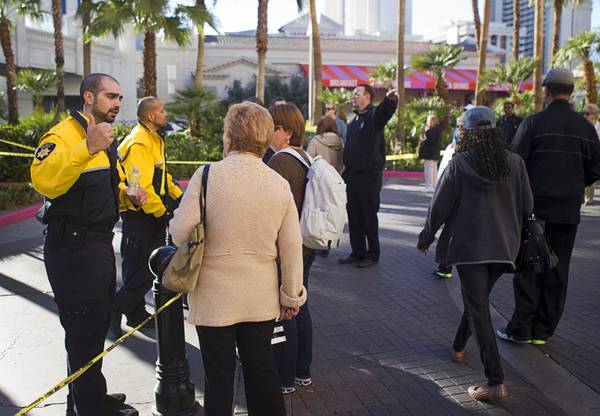While police continue to search for a suspect in last week's shooting and taxi explosion that killed three people on the Strip, the question remains: Will the violence discourage people from coming to Las Vegas?
Most tourism leaders say it won’t, and a local expert in crisis communications said the Las Vegas Convention and Visitors Authority did all the right things to assure the public that Las Vegas is a safe place to visit.
The million-dollar question (literally), however, is: Does the public buy that?
“What’s really important early on is to put everything in context,” said Lori Nelson, vice president of corporate communications at Station Casinos and a crisis communications expert. “It’s easy for a situation to get blown out of proportion, and it was good for the LVCVA to convey that what happened on the Strip on Thursday was an isolated incident.”
Nelson has been sought out to defuse incidents that companies fear could damage their image, and she has reviewed case studies of corporate missteps that have cost businesses millions. She said entities must take ownership for anything they may have done wrong and explain to the public what steps are being taken to prevent them from happening again.
In this case, she said, the LVCVA made all the right moves in emphasizing its relationship with Metro and pointing out statistics that show violent crime was down in 2012 and is down even further so far in 2013.
Nelson was one of the architects of Station’s image-building efforts after O.J. Simpson was arrested for robbery at Palace Station in 2007. She also studied how public relations teams addressed an outbreak of Legionnaires disease at local hotels and how the manufacturers of Tylenol calmed people's fears when someone tampered with boxes in Chicago drug stores in 1982.
“It’s important early on to inform the public and have a voice in the situation,” Nelson said. “They have to have accurate information so that other sources don’t take over the story.”
In the case of the Strip tragedy, the LVCVA immediately touted its relationship with Metro, noting that it gave police whatever information it could provide. The tourism agency even went so far as to point out that Metro has a police station at the Las Vegas Convention Center, a reassurance and reminder to meeting planners that police are close if trouble arises.
“The Las Vegas Convention and Visitors Authority releases an annual report, the Visitor Profile Study, which is based on surveys with our visitors,” the LVCVA noted shortly after the shooting and crash. “While there is not a question specific to safety, we do ask visitors about their overall satisfaction with their trip, which encompasses all elements of their experience. According to our latest Visitor Profile Study, 92 percent of our visitors reported being ‘very satisfied’ with their Las Vegas trip. In addition, 84 percent of our guests are repeat visitors, both of which indicate a positive experience overall.”
“Reputation and credibility is everything," Nelson said. "Actions speak louder that words, and it’s important to reinforce the actions that were put in place.”
When O.J. Simpson tried to take sports memorabilia at gunpoint in a room at Palace Station, Nelson said her company made a conscious decision not to exploit the circumstance. She denied media requests for access to the hotel room.
“We chose not to be a part of the media circus,” she said.
When television stations updated the story, they ran videos of the exterior of the property but never the inside.
“I think the message we sent was that we were an innocent bystander, just like Las Vegas was a bystander in this most recent incident that could have happened anywhere,” she said.
But some critics aren’t buying it. They say the LVCVA’s “What happens here, stays here” campaign and some of the attractions available to visitors can be interpreted as community permissiveness toward fast cars, alcohol, guns, sex and drugs.
The LVCVA has stressed that the freedom for tourists to do things they can’t do in their hometowns doesn’t extend to illegal activities.

